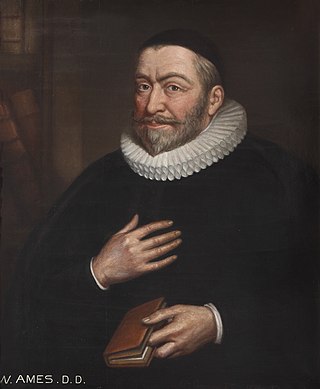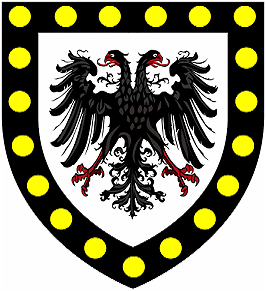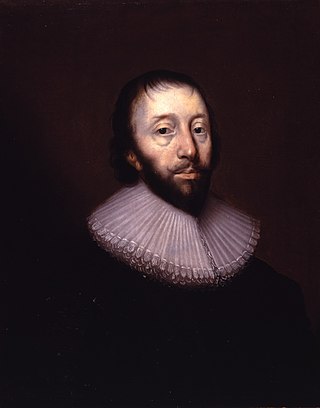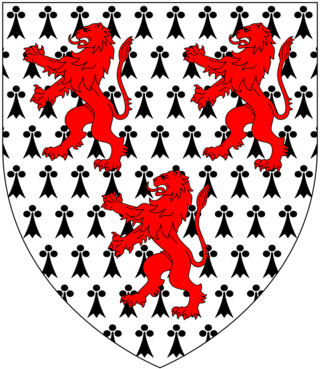Life
William Boswell was a native of Suffolk. He was educated at Jesus College, Cambridge, of which he was elected fellow in 1606. [1] He was incorporated at Oxford University on 12 July 1608 and became proctor in 1624. He was one of the keepers of the state paper office and served as secretary to Baron Herbert. In 1624 he was elected Member of Parliament for Boston in a by-election to the Happy Parliament. He was re-elected MP for Boston in 1625. [2]
Boswell subsequently entered the diplomatic service, and was appointed secretary to Sir Dudley Carleton, then ambassador at The Hague. Boswell eventually succeeded Carleton in 1632. [3] He was knighted at Bockstal near Baldock on 25 July 1633.
A large share of Sir William's attention while ambassador was taken up with the controversy between the Gomarists and the Remonstrants (Arminians). He continued the policy of Sir Dudley Carleton, and supported the rigidly Calvinist Gomarists against the Remonstrants. [3] This was for political reasons, and otherwise Boswell was an ally of William Laud. He took a close interest in the émigré English churches in the Netherlands, and in 1633-4 helped John Paget intrigue against John Davenport. [4] Charles I ordered Boswell to back Edward Misselden, influential in the Merchant Adventurers, against John Forbes. [5] In 1638 Boswell had a prosecution brought against John Canne. [6] He was now poised against the Gomarists, and worked together with Remonstrants to combat Scottish Covenanter propaganda. [7]
When the First English Civil War broke out, Boswell's efforts were directed towards preserving the neutrality of the Dutch. Despite the efforts of Walter Strickland, who was sent over by Oliver Cromwell to counteract his influence, he was quite successful in his political mission. [3] He could not prevent Parliament appealing to Dutch public opinion, however. Despite Boswell's appeals to the Dutch authorities to ban Parliamentary propaganda, it circulated widely in the Republic, and Boswell found himself compelled to respond by publishing royalist pamphlets. [8]
Sir William was also a man of letters and a scholar, as is shown in his correspondence with John de Laet, which touches upon subjects ranging from Oriental literature and the compilation of an Arab dictionary to Edward VI's treatise 'De Primatu Papae,' and Sir Simon d'Ewes's Saxon vocabulary. Another correspondent was the Laudian Stephen Goffe. [3]

William Ames was an English Puritan minister, philosopher, and controversialist. He spent much time in the Netherlands, and is noted for his involvement in the controversy between the Calvinists and the Arminians.

Sir Robert Killigrew (1580–1633) was an English courtier and politician who sat in the House of Commons at various times between 1601 and 1629. He served as Ambassador to the United Provinces.

Sir Dudley Digges was an English diplomat and politician who sat in the House of Commons between 1610 and 1629. Digges was also a "Virginia adventurer," an investor who ventured his capital in the Virginia Company of London; his son Edward Digges would go on to be Governor of Virginia. Dudley Digges was responsible for the rebuilding of Chilham Castle, completed in around 1616.

Dudley Carleton, 1st Viscount Dorchester was an English art collector, diplomat and Secretary of State.
Sir Isaac Wake was an English diplomat and political commentator. He served as ambassador to Savoy for sixteen years, and later as ambassador to France. His brother Lionel Wake was a merchant in Antwerp.

Sir John Glanville the younger, was an English politician who sat in the House of Commons at various times between 1614 and 1644. He was Speaker of the English House of Commons during the Short Parliament. He supported the Royalist cause in the English Civil War.

Sir Francis Wortley, 1st Baronet (1591–1652) was an English poet and politician who sat in the House of Commons between 1624 and 1626. He supported the Royalist cause in the English Civil War.
Charles Berkeley, 2nd Viscount Fitzhardinge was an English politician who sat in the House of Commons at various times between 1621 and 1668. He supported the Royalist cause in the English Civil War. He succeeded by special remainder to the peerage of his son who predeceased him.
Ralph Goodwin was an English politician who sat in the House of Commons variously between 1624 and 1644. He supported the Royalist cause in the English Civil War.
Sir Richard Harrison was an English politician who sat in the House of Commons variously between 1621 and 1640. He supported the Royalist side in the English Civil War.
Sir George Horner was an English lawyer and politician who sat in the House of Commons at various times between 1645 and 1660.
Sir John Carleton, 1st Baronet was an English landowner and politician who sat in the House of Commons from 1628 to 1629.

Jacobus Taurinus was a Dutch preacher and theologian, a main supporter of the Remonstrants and polemical writer in their cause.

Sir John Chudleigh was an English politician who sat in the House of Commons in 1626.
Sir Arthur Lake (1598–1633) was an English politician who sat in the House of Commons from 1624 to 1626. His reputation was badly damaged by the notorious Lake-Cecil feud which lasted from 1617 to 1621, and both scandalised and fascinated the Jacobean Court.

Sir John Oglander was an English politician who sat in the House of Commons from 1625 to 1629. He is now remembered as a diarist.
Edward Layfield was a Church of England priest in the 17th century.
This page is based on this
Wikipedia article Text is available under the
CC BY-SA 4.0 license; additional terms may apply.
Images, videos and audio are available under their respective licenses.
 This article incorporates text from a publication now in the public domain : "Boswell, Sir William". Dictionary of National Biography . London: Smith, Elder & Co. 1885–1900.
This article incorporates text from a publication now in the public domain : "Boswell, Sir William". Dictionary of National Biography . London: Smith, Elder & Co. 1885–1900.






